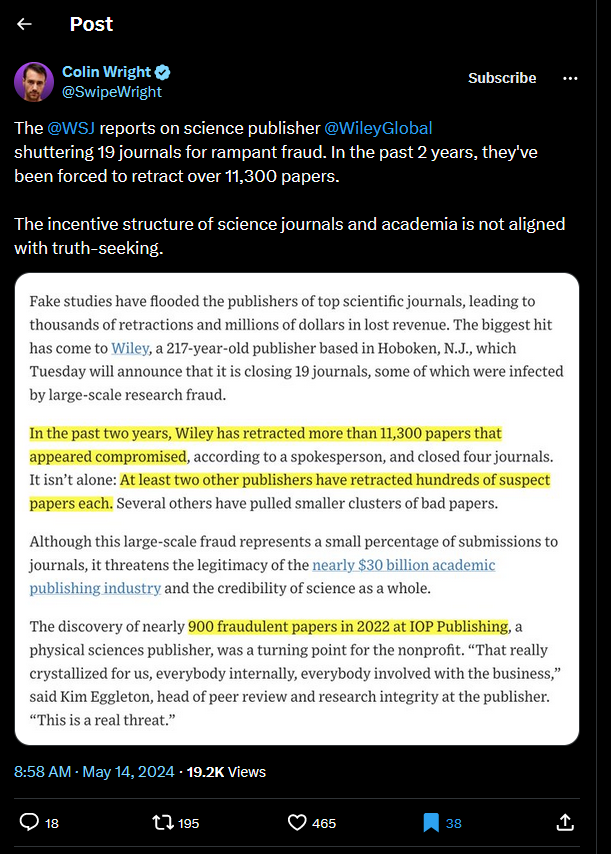Gone are the days when science journals focused on science. If you open a peer-reviewed publication in 2024, you’re just as likely to read an ill-informed opinion piece defending organic farming, gun control and even outright Marxism as you are original research. Science, formerly one of the top journals in the world, recently argued that we should “teach indigenous knowledge alongside science” in public schools, and the journal’s editor Holden Thorp seems to think that just about everybody can be identified as a scientist. As my colleagues Drs. Henry Miller and Chuck Dinerstein recently observed, Thorp believes that everyone deserves a trophy.
Not to be outdone by Science, its chief competitor for top academic journal, Nature recently published an op-ed advocating mass wealth redistribution as a means of redressing inequality. The article is couched as a book review of Ingrid Robeyns new title Limitarianism and carefully headlined with the question “How Rich Is Too Rich?” but the content of the story makes it clear where the author’s sympathies lie:
“Over the past two decades, as Robeyns sets out, scholars have increasingly documented how democracy can be undermined by the disproportionate political power of media tycoons, rich founders of philanthropic organizations and large political-party donors. Extreme wealth concentration limits governments’ abilities to invest in public goods, such as education, health care and climate-change mitigation.
Robeyns proposed solution is a $10 million cap on individual wealth and $200,000 limit on individual inheritance with the excess funds “redistributed by the state to younger citizens so that everyone would ‘start their adult life without worrying unduly about how they will get by.’”
Whatever you think of this argument, the more important point for our purposes is this: academic publishers are compromised institutions that lobby for progressive political causes more than they advance legitimate scientific research. They’ve outlived their usefulness and it’s time we quit propping them up with public money.
Hypocrisy abounds
There’s no need to refute Nature’s foolish arguments for wealth redistribution overseen by hubristic technocrats. If you think this economic system produces anything but poverty, here’s a long list of scholarly works that will disabuse you of that misconception.
However, I do want to focus on Nature’s gross hypocrisy as a springboard into the larger problem with academic publishing. Age-old welfare schemes like the one Nature endorsed tend to benefit the powerful and wealthy thanks to rent seeking, which occurs when politically connected institutions and corporations lobby for handouts that benefit them financially at the expense of some other unfortunate segment of society.
Academic publishers are a textbook example. These billion-dollar corporations fill their journals with studies largely funded by taxpayers. They then sell the research results back to publicly funded university libraries, which pay massive subscription fees to journals like Nature. Or, on the open-access model, scientists pay publication fees directly to the journals. Most of this research is questionable at best and critically flawed at worst, and the majority of it is never cited or even read by other scientists. Unsurprisingly, SpringerNature, which publishes the Nature family of journals, is eager to keep this grossly inequitable business model in place.
Similar examples of shameless grifting go on seemingly forever. Public health NGOs receive billions in state funding—which they then use to lobby for more state funding, even if it means diverting funds from health care programs for pregnant women. Unprofitable industries that sell products most consumers don’t want (and can’t afford anyway) receive lavish federal subsidies because they have friends in Washington. Of course, I’m talking about the electric vehicle makers whose products Nature eagerly endorses.
Put another way, the academics who call for redistribution and the journals who promote their work have no problem with “extreme wealth.” They just want to decide who receives the payola; naturally, they prefer that the money fund their work and their pet ideological causes.
Institutional neutrality is a myth
Critics of politicized science will typically propose institutional neutrality as a solution to the problem we’ve examined here. As the argument goes, academics should focus on their field of study and leave the culture war to politicians and voters. But this solution isn’t viable, and Nature’s asinine defense of wealth redistribution is merely the latest example of why.
Like any influential institution, academia is populated by people with ideological commitments that shape their work. Some scientists are even willing to acknowledge that they’re not engaged in an objective search for the truth so much as a campaign to achieve certain political goals. Their research is a vehicle to advance these causes. Princeton anthropologist Agustín Fuentes was refreshingly honest about this in a recent article for Science:
“...[S]cience as a field of practice, and scientific organizations as entities, have never been neutral … When it comes to issues in human society that scientific knowledge and practice can inform upon, merely sitting on the sidelines, pretending to be ‘neutral,’ is also a political decision—one that often has detrimental effects on both science and society.” [my emphasis]
Fewer journals, fewer scientists
The Wall Street Journal reported this week that Wiley, another behemoth in academic publishing, is shuttering 19 of its journals after retracting more than 11,000 studies over just the last two years. Commenting on the situation, evolutionary biologist Colin Wright observed that the “incentive structure of science journals and academia is not aligned with truth-seeking.”

He’s obviously correct given the examples we’ve discussed. Journals are churning out ever-increasing amounts of flawed research and partisan advocacy that is not supported by the evidence and deeply unpopular with the general public.
The only real solution is to eliminate academic publishing as it exists and replace it with something better, and there are two important steps we can take to achieve that goal. First, we should stop paying corporations like SpringerNature and Wiley to lock government-funded research behind expensive paywalls. Everybody gets access to science paid for out of the public purse.
This “open science” model would deprive journals of their massive 36% profit margins and serve as “an important safeguard against political interference in science,” the White House Office of Science and Technology Policy (OSTP) recently argued. As an added benefit, this approach would expose the body of scientific literature to additional scrutiny from scientists outside the academy and interested laymen. Post-publication peer-review platforms like PubPeer illustrate the value of publicly (and often anonymously) critiquing academic research; they could serve as a viable alternative to traditional journals.
The other solution is to reduce the number of academic scientists. As Dr. David Zaruk has noted, there is a veritable army of researchers struggling to publish their next paper and secure another grant to keep their careers alive. When they can’t get another dime of federal funding to study miracle vegetables or the evils of processed food, many of them end up working for environmental NGOs or otherwise promoting explicitly political, unscientific causes.
This is a shameless, unethical scam. It's time we put an end to it.




